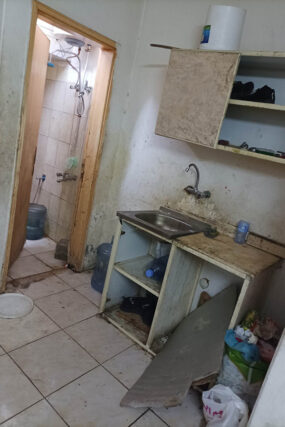
Momtaj Mansur wanted to go home, back to his family and the pastures of Nepal’s southern plains. He felt like a prisoner, he says, in a grimy bunkhouse in Saudi Arabia, out of work, hungry and deep in debt. His weight was dropping and his thick, dark hair was falling out.
The 23-year-old had come to Riyadh, the Saudi capital, in September 2021 to work for one of the world’s biggest companies: Amazon. The job, he believed, could offer him a new future and provide for his mother and brother.
Things hadn’t worked out the way Mansur had hoped. Before he left Nepal, he says, a local labor recruiter pressured him into paying a huge fee in exchange for securing him a job inside an Amazon warehouse. Once he was in Saudi Arabia, he says, he found himself shuffling day after day between two equally miserable locations.
One was a tiny room, filled with bunk beds and insects, that he shared with six to seven other men in a rundown building that offered salty, undrinkable water.
The other was a vast two-story industrial structure called RUH 6, where he spent his nights as a “picker,” hustling up and down warehouse aisles grabbing iPhones, multipacks of Red Bull and other items ordered by Amazon’s customers across the Arabian Peninsula. Amazon managers berated him for being slow, he says, even as he was blowing past company targets demanding he pick 70 to 80 items an hour.
Then things got worse. In May 2022, Mansur says, he and many of his Nepali co-workers were let go from their jobs at the Amazon warehouse without warning or explanation.
Mansur says he pleaded with the Saudi labor supply company that held their employment contracts and had placed them in temporary positions at Amazon: If there was no more work, let them return to Nepal.
“I told them: Either kill us or send us home, but don’t give us so much pain.”
I told them: Either kill us or send us home, but don’t give us so much pain.
— Momtaj Mansur, former worker for Amazon in Riyadh, Saudi Arabia
The only way to escape, he says, was to pay the labor supply firm an exit fee of more than $1,300 as a penalty for leaving before the end of his two-year contract. It was an enormous sum for Mansur and his family, which subsisted on about $300 a month in income along with rice, wheat and grass peas it grew on a fifth of an acre it shared with his uncles’ families.
In the end, his family sunk itself even deeper in debt by taking out a loan — at 36% interest — to pay the exit fee.
Momtaj Mansur is one of dozens of current and former workers who claim they were tricked and exploited by recruiting agencies in Nepal and labor supply firms in Saudi Arabia and then suffered under harsh conditions at Amazon’s warehouses. Their accounts provide insight into how major American corporations profit, directly or indirectly, from employment practices that may amount to labor trafficking, which is defined as using force, coercion or fraud to induce someone to work or provide service.
Forty-eight of the 54 Nepali workers interviewed for this story say recruiters misled them about the terms of their employment, falsely promising they would work directly for Amazon. All 54 said they were required to pay recruiting fees — ranging from roughly $830 to $2,300 — that far exceed what’s allowed by Nepal’s government and run afoul of American and United Nations standards.
During their time in Saudi Arabia, these workers say, they were paid a fraction of what direct hires for Amazon’s Saudi warehouses earn.

Even after they were laid off from work at Amazon, workers say, their labor supply company sought to squeeze money out of them, taking advantage of Saudi laws that give employers broad powers to control foreign workers’ freedom of movement. Mansur and 19 other Nepalis interviewed for this story say labor supply firms told workers they couldn’t go home to Nepal unless they paid exit fees that often equaled several months’ wages.
“We have already paid money to come here and we have to pay additional money to return?” one current worker says. “We feel trapped.”
In a written reply to questions for this story, Amazon acknowledges that some workers at its Saudi facilities have been mistreated.
“Providing safe, healthy and fair working conditions is a requirement of doing business with Amazon in every country where we operate, and we are deeply concerned that some of our contract workers in the Kingdom of Saudi Arabia . . . were not treated with the standards we set forth, and the dignity and respect they deserve,” the statement says. “We appreciate their willingness to come forward and report their experience.”
The company adds that it is “implementing stronger controls” to “ensure similar incidents do not occur and to raise overall standards for workers in the region.” This includes “providing enhanced trainings for our third-party vendors on labor rights standards with a specific focus on recruitment, wages, and deception.”
‘Unique vulnerability’
This story was produced by the International Consortium of Investigative Journalists, the Guardian US, NBC News and Arab Reporters for Investigative Journalism as part of Trafficking Inc., a joint reporting effort that has been examining human trafficking and labor exploitation in Asia, the United States, Africa and the Middle East.
In interviews, workers provided similar descriptions of unfair practices by Amazon and labor agents involved in their employment. To support their accounts, they provided photos, videos and hundreds of documents, including passports, job contracts, plane tickets, arrival documents, Amazon ID badges, pay slips, work permits, medical records and screenshots of internal chat messages. Several former workers spoke on the record, but current workers and some former workers, fearing retaliation, asked that their names not be used.
The interviews describe practices that are considered markers for potential labor trafficking under U.S. law and U.N. standards. These indications can include subjecting workers to abusive working and living conditions; restricting their movement and making false promises about wages, working conditions and the identity of the employer. U.N. standards also say private recruiting agencies should never charge workers any fees or costs; it should be up to the employer to pay the recruiting firms.
The practices described by the warehouse workers also appear to violate Amazon’s labor policies. In a 2022 statement, Amazon said its standards “recognize domestic and foreign migrant workers’ unique vulnerability” and “make clear that workers may not be charged recruitment fees at any point in the recruitment process.”
The human rights group Amnesty International confirmed to ICIJ and other media partners that it has conducted its own investigation into the treatment of Nepali workers at Amazon’s Saudi operations. Amnesty says it collaborated with another nongovernmental organization to interview 22 workers who report being subjected to abusive practices, including being forced to pay large recruiting fees and being deceived about the terms of their employment.
Ella Knight, a London-based labor rights researcher for Amnesty, says it informed Amazon in June about these issues and followed up with fuller details of its findings in August. Knight says it’s likely that both Amnesty’s investigation and the news outlets’ separate investigation contributed to Amazon’s decision to publicly pledge to put stronger controls in place and make sure workers are repaid for their recruiting fees.
Some of the Nepali laborers told ICIJ they don’t want to put all the blame on Amazon. If they didn’t have labor supply companies standing between them and a real job at the global company, they say, their situation might have been tenable. One current worker says he’d like Jeff Bezos, the company’s founder and executive chairman, to know that he’s suffering under the present arrangement, but that he’s “ready to go anywhere to work at Amazon if it’s a direct hiring.”
Bezos, the world’s third richest person, vowed in 2021 to make Amazon the “Earth’s Best Employer.”
One former worker says he’d like Bezos to know: “You are in this position because of our work. You would not have been in that position without the efforts of laborers and helpers from Nepal, the Philippines, India, Bangladesh, Pakistan and others. But you are ignoring workers’ concerns.”
Several workers interviewed by ICIJ say that Amazon officials were aware of many of the problems they faced in Saudi Arabia. They say workers complained to Amazon warehouse managers or human resources agents about low or missing wages, poor housing conditions and the strains of warehouse work.
“They know everything about our situations and sufferings,” says Amiri Yadav, who worked at Amazon distribution centers in Saudi Arabia from 2021 to 2023.
Amazon says in its statement that “our supply chain audit process and our own investigation surfaced violations of our standards” in Saudi Arabia, prompting it to take action to deal with the complaints. It added that it has “a wide variety of ways that workers at our sites can report issues with how they are treated, including a confidential 24-hour hotline.”
Dismal calculations
Amazon made a big move into Saudi Arabia in 2017, purchasing the Middle Eastern online retail giant Souq.com. It later rebranded Souq.com’s Saudi operations as Amazon.sa and boosted its labor force by bringing in workers from Pakistan, India, Bangladesh and Nepal. Amazon currently employs nearly 1,500 permanent and seasonal workers in Saudi Arabia.
As one of Asia’s poorest countries, Nepal has long been a major source of transnational workers. In a 2010-2011 census, more than half of Nepali households reported receiving money from family members working outside the country. In 2021, overseas remittances back home accounted for nearly a quarter of Nepal’s gross domestic product.
Many Nepali workers have heard horror stories about bad working and living conditions from family members and neighbors who have gone overseas. They know to watch out for certain countries and employers and to seek direct employment, rather than working for a labor supply company. But immigration and labor policies around the world are often so stacked against them that they end up exploited. In a survey published in 2017 in the prestigious British medical journal BMJ, most Nepali men who have worked outside the country indicated they “experienced exploitation at all stages of the migration process.” Half reported being targets of deceptive recruiting practices.
“Everyone gets trapped in foreign employment,” says a Nepali laborer currently working at an Amazon warehouse in Saudi Arabia. “No matter how smart you are, you’re deceived in the end.”
Everyone gets trapped in foreign employment. No matter how smart you are, you’re deceived in the end.
— Nepali laborer working at an Amazon warehouse in Saudi Arabia
These conditions force migrant workers to make dismal calculations — seeking not so much the best landing spot but the least worst one, where they can earn enough wages to make the transit and trouble worth it.
When an agent with Rove International, a Nepali recruiting firm based in Kathmandu, told Momtaj Mansur he could get a job at Amazon, Mansur did some research. He decided that a big American company like Amazon might differ from the abusive employers many migrant workers encounter. Knowing that “agents tell lies,” he says, he asked repeatedly whether he’d be an employee of Amazon or a labor supply company. The agent “confirmed to me that it was direct employment from Amazon, and it would change my life,” Mansur says.
He was surprised, he says, when Rove International told him that he must pay a recruiting fee of roughly $2,300 — especially since he knew Nepal’s government caps the fees that employment firms can charge workers heading to Saudi Arabia at less than $85. Six other Nepalis who sought jobs at Amazon’s Saudi warehouses confirm that Rove International also charged them recruiting fees of more than $1,000 each. Like many other Nepali workers, Mansur says he paid this stiff fee because he didn’t want to lose the chance to work for Amazon.
Rove International did not answer a detailed list of questions for this story. When a reporter visited its offices in Kathmandu on Sunday, a company official said: “We followed all legal procedures set by the government and these workers knew where and how they were going to work.”
Nepali workers heading to Saudi Arabia are especially vulnerable because Nepal’s government has failed to enforce its policy forbidding recruiting agencies from charging high fees, according to Nepal’s parliament, its Supreme Court and the U.S. State Department.
Workers seeking jobs in some Arab countries are also at risk because of the “kafala” system — a matrix of labor and immigration laws that gives employers wide control over migrant workers’ employment and immigration status. In Saudi Arabia and other countries where forms of the kafala system still exist, many foreign workers are fearful they can be punished if they leave an employer.
Arriving in the Kingdom
In September 2021, after taking out a loan to pay his recruiting fee, Mansur traveled from his home to Kathmandu and got on a Jazeera Airways flight — the first time he’d ever flown, and his first time outside Nepal.
When he arrived in Riyadh, Mansur and other Nepali workers were met by Amazon officials — or so Mansur thought. He says these men demanded that he and the others sign an employment contract, but wouldn’t allow them to read the paperwork. They were told, Mansur says, that if they didn’t sign, they’d have no place to sleep and no job.
“I signed the document without reading it because I was scared,” he says.

A few days later, Mansur realized that the men who met him at the airport probably weren’t Amazon officials. He’d started working at an Amazon distribution center in Riyadh, and noticed that his green ID badge differed from the blue badges worn by many other workers. The workers with blue badges were employed directly by Amazon, a Pakistani co-worker explained. Those wearing green badges weren’t Amazon employees after all. They were temporary workers.
Mansur’s actual employer, it turned out, was Abdullah Fahad Al-Mutairi Co. — a Saudi labor supply firm that profits from selling labor to Amazon and other major companies. Records show Nepal’s Department of Foreign Employment issued work permits in September 2021 to Mansur and 36 other Nepalis whose labor contracts were being channeled to Al-Mutairi by Rove International, the Nepali recruiting firm.
Forty-nine of the 54 Nepali workers interviewed for this story say they worked for Al-Mutairi. Several say they realized this just before they left Nepal and continued on because they’d already shelled out money for recruiting fees. But 42 say they didn’t know the truth until after they’d landed in Saudi Arabia — and, in most cases, after they’d taken out loans to pay big recruiting fees. They knew there was little chance of getting those fees back, so they had to stay in Saudi Arabia — working for an employer they didn’t want to work for to pay off the loans that made it possible for them to get jobs they no longer wanted.
To make matters worse, workers say, the labor supply company didn’t provide equal pay. Nepali laborers generally earned about $350 a month working the day shift at Amazon warehouses, according to interviews with workers and pay slips and employment contracts obtained by ICIJ. In contrast, several Nepali workers say, colleagues who had similar jobs but were direct employees of Amazon earned roughly $800 to $1,300 a month.
“What the fuck?” Mansur says. “We worked more and harder, but the salary we received was much less.”
Al-Mutairi did not respond to requests for comment.
In its statement, Amazon says that since it learned about the violations of its standards, it has worked closely with the Saudi firm “to align on a compliance plan, which they’ve agreed to, that addresses those violations and complies with our standards. This includes ensuring their employees are repaid for any unpaid wages or worker-paid recruitment fees, are provided clean and safe accommodations, and that the vendor is committed to ensuring ongoing protections for workers.”
‘Workers are afraid’
Amazon’s warehouses in Saudi Arabia are massive. Its newest distribution center, opened in Riyadh in May, spans 390,000 square feet across five floors, with a capacity of 2.7 million cubic feet. It can hold more than 9 million items — enough, Amazon says, to fill 30 Olympic-size swimming pools.
Inside Amazon’s distribution centers, the pace is fierce. Pickers roam the floors, grabbing items and handing them off to packers, who stand for hours at a time. Workers say managers keep watch on pickers through closed-circuit cameras and on pickers’ scanners, which list them as “idle” if they’re not scanning items rapidly. Nepali workers report that senior-level Amazon staffers stalk them up and down the aisles of the warehouse, yelling, “Yalla! Yalla!” — an Arabic exclamation meaning “hurry up.”
Here’s a sneak peek inside our newest fulfillment center in Riyadh, Saudi Arabia. Some fun facts about the facility:
🏊 Storage capacity equivalent to 30 Olympic-sized swimming pools.
📦 Holds over 9 million products.
⚡️ Powered 100% by electricity, not fossil fuels.
📈 It… pic.twitter.com/slNFeRG9m5— Amazon (@amazon) June 15, 2023
Over a normal shift, Mansur says, he and other pickers covered as many as 9 miles across warehouse floors. “I would feel extremely weak. My legs would hurt,” he says. “When I returned home, I would feel like I was being pierced with needles or walking barefoot on stones. My whole body would ache.”
During rush periods — such as sales or holidays — supervisors monitored restroom activity, sometimes admonishing them, workers say, for taking too much time away from the warehouse floor.
“They wanted us not to take breaks when there was a high work demand,” says Surendra Kumar Lama, who worked at an Amazon warehouse in Saudi Arabia from 2021 until the end of 2022. “They would stand near restrooms and water stations because workers are afraid of them. Many times, I waited half an hour or an hour to go to the restroom because they were there.”

After long days at Amazon’s warehouses, workers come home to living accommodations provided by Al-Mutairi. Many say the housing units are cramped and squalid, with cockroaches scuttling across the floor and a limited and salty water supply that led to rashes and hair loss. Often, workers say, six to eight men sleep and eat packed together in one room arrayed with bunk beds.
“How can eight people stay together in a small room?” Mansur says. “There was no space to put personal belongings. We would keep those on our beds.”
In some cases, workers successfully lobbied Amazon officials to prod Al-Mutairi to address the housing problems. But improvements often didn’t last, and the lack of clean water continues to be a problem, workers say. When they reported the water issue to Amazon, says one former worker, “Al-Mutairi threatened us: ‘Who complained about this? We will make him jobless!’ ”
The labor supply company also makes things difficult, workers say, when they try to get time off to attend funerals, births and other family events back home in Nepal. In such cases, 23 current and former workers say, Al-Mutairi gives a worker two choices. He can pay a large fine upfront. Or he can persuade co-workers to sign a “guarantor” contract agreeing to pay a fine on his behalf if he doesn’t return to Saudi Arabia to complete his contract.
One former worker says he missed the birth of his son and his father’s funeral because Al-Mutairi wouldn’t let him go home. Even after he showed the firm his father’s death certificate, he says, the company said he could go only if he paid a $1,600 penalty — more than four months’ salary. He couldn’t afford it, and he couldn’t find a co-worker willing to sign as his guarantor, he says.
“I couldn’t be with my dad when he died. I couldn’t hold my son when he came into this world,” he says. During his time in Saudi Arabia, “I didn’t achieve anything, but I lost many things.”
‘So much power’
One afternoon in May 2022, a few hours before his next shift began, a message popped up on Mansur’s mobile phone: “Don’t go to duty,” it said, and listed dozens of names as “people stopped from Amazon.” He searched and found his own name.
“I didn’t know why I was fired. Nobody knew why they were fired,” he says. “I was working well.”
The laborers from Nepal had come to the Persian Gulf expecting they would be working difficult but steady jobs. Instead, they find that job security is almost nonexistent. Workers say Amazon lets go of large numbers of temporary workers from its warehouses when customer orders slow — and tracks workers’ lapses and uses them as excuses for dismissing individuals. These failings can include not meeting targets for “picking” items, pulling the wrong products off shelves or using a personal cell phone in the warehouse.
“Every day, we fear that we could be terminated the next day. We work every day as the last day of our work,” says a Nepali still working in an Amazon warehouse in Riyadh.
Workers say their sense of fear grew after thefts of iPhones and other items from Amazon’s warehouses prompted the company to tighten security. They claim security guards became more suspicious of Nepali workers and raised false allegations against some of them as a pretext for firing them.
“The security guards have so much power that even managers can’t help the workers,” says Hem Thapa, who worked in multiple Amazon warehouses in Saudi Arabia.
Sanjay Kumar Mahara, who worked as a picker, says he was falsely accused of stealing earlier this year when he accidentally pulled out two pieces of jewelry from a shelf as he was trying to fill an order for one piece.
A guard stopped him in the aisle, searched the tote bag he used to carry items from the shelves to the packers, found the two items and then took him to a manager, Mahara says. As the guard and manager spoke in Arabic — which Mahara couldn’t understand — Mahara tried to tell his side of the story in English.
He was told not to come back to the warehouse while the problem was being worked out, he says, but after several days Al-Mutairi put him on a flight back to Nepal.
“If any mistakes are made at work, Amazon should investigate and try to solve the issue,” Mahara says. “But they rush to terminate the workers. I feel injustice. But what can I do?”
‘The last stage’
Once they’re fired or laid off, workers say, a new ordeal begins. They’re booted out of housing reserved for those working at Amazon, they say, and shunted to even worse housing set aside for those without jobs. They get no wages or food allowance. Many languish for weeks or months, they say, waiting for Al-Mutairi to place them back with Amazon or some other business.
“I cry out when I look back at my past month,” says a recently fired worker who’s stuck in Riyadh. “I never imagined I could have such a life.

Unemployed Nepalis describe their new lodgings as “dirty” and “abandoned” — a building without beds or internet service. When workers get laid off en masse, they often can’t find even a tiny space in the building to sleep because it is already occupied by dozens of other jobless workers.
During Mansur’s time there, he survived by eating kuboos — Arab flatbread — once a day and borrowing money from his former co-workers. Some days, he says, he didn’t eat at all. When his friends couldn’t support him anymore and Al-Mutairi didn’t find him another job, he decided to ask his family to take out a big loan so he could pay the exit penalty and go back to Nepal. “It was better going home than dying of hunger,” he says.
Other jobless workers have slipped away from the accommodations and worked illegal, off-the-grid jobs.
Loneliness, hunger and stress pushed many jobless workers toward dark turns of thought. Yadav, one of the workers who says he was fired after being falsely accused of theft, says Al-Mutairi managers refused to let him go home to Nepal until he threatened to “record a video complaining about you and commit suicide.”
Manish Kumar Sodari, another worker who landed in the oblivion of unemployment, says he spent days caring for another laid-off worker who was talking about hanging himself. Soon, Sodari says, he began having suicidal thoughts himself.
“How can one stay helpless for three to four months?” he told an ICIJ reporter in January. “I have already suffered a lot. I am at the last stage.”
Home — for now
Sodari got home by getting himself arrested. He did this, he says, with help from a man who is familiar with how difficult it is for Nepali workers to escape Saudi Arabia. The man advised him to go to a certain street and loiter until he was approached by a police officer.
Sodari says he was taken to jail after admitting he didn’t have a job or valid residency permit. He spent about two weeks in detention, he says, then the Saudi government deported him. He stayed briefly in Nepal before heading out to seek a job in India.
Another former Amazon warehouse worker, Thapa, returned to Nepal before taking a job in India at a garment store. He had to leave home again to find work, he says, because almost all of his earnings in Saudi Arabia went to repay the loan that had paid the recruiting fee for his Amazon job.
“I couldn’t save money working in Saudi,” he says. “I went empty-handed. I returned empty-handed.
Other former Amazon workers are in worse financial shape. They’re deep in debt, they say, because of recruiting fees, low wages, layoffs and exit penalties.

Mansur feels guilty about the loans that he and his family took out to get him to the Persian Gulf and bring him back to Nepal. Interest charges are piling up. He fears the village moneylenders will seize the family’s patch of land.
“I lost time and money working at Amazon. I lost everything,” he says. “I lost my body and my strength. . . . My family’s financial situation is devastated now.”
But like many migrant workers around the globe, Mansur isn’t going to let a harrowing experience stop him from trying to find an employer that pays a fair wage and treats him decently. He’s begun to look again for an overseas job. He’s open to working most anywhere — except Saudi Arabia.
Contributors: Delphine Reuter (ICIJ); Shyam Karki (freelance); Andy Lehren and Anna Schecter (NBC News); Tanka Dhakal, Eman Alqaisi, Mara Kessler and Hoda Osman (Arab Reporters for Investigative Journalism).
Contributors to this story were supported by the Fund for Investigative Journalism and the McGraw Center for Business Journalism at the Craig Newmark Graduate School of Journalism at the City University of New York.








